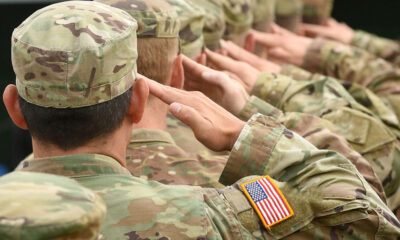
Politics
4 Facts To Remember on the 16th Veterans Day Since 9/11
The difficulties that veterans face when returning home from the service have been well-documented. Here’s what you should know and what you can do to help.
America has 18.1 million veterans, according to 2015 data from the Census Bureau. The plurality of these veterans served in the Vietnam War — 6.8 million, as of 2015. However, regardless of the conflict the veterans faced, many of them return home and struggle with a variety of economic and health issues, often directly as a result of their service in this country’s military.
This Veterans Day, we present you with four important points to consider about the United States’ military veterans, and what you can do to help.
Veterans could benefit from medical marijuana.
As many as 20 percent of veterans who served in Iraq or Afghanistan suffer from some form of PTSD, traumatic brain injury (TBI) or depression, according to the RAND Corporation. Additionally, a 2012 estimate guessed that 250,000 post-9/11 vets have some form of mental-health issue. There’s been five years of combat since then.
These hundreds of thousands of veterans suffering from mental health issues qualifies as a public-health emergency — especially because they have an unusually high risk for suicide. Let’s dwell on suicide for a second. We should. We should spend more time talking about it than we do “Islamic terror,” because suicide has killed more Americans than the Taliban, al-Qaeda, ISIS and insurgents in Iraq combined. By Veterans Day 2015, more than 27,000 Iraq and Afghanistan vets had taken their own lives, more deaths than in combat in both countries combined.
The American Legion is considered the “most conservative” veterans’ advocacy organization. According to an American Legion poll conducted earlier this fall, more than 83 percent of military vets want their government — the federal government — to legalize marijuana for medical purposes. Put another way: As per this poll, the strongest support for legal weed in the country is coming from combat veterans, at least some of whom have been deployed overseas to destroy cannabis crops.
The American Legion poll revealed another very salient fact: More than one in five vets say they use cannabis to treat some kind of medical problem. That would align perfectly with the number of vets with PTSD.
We don’t “know” this for certain, because marijuana’s official status as a deadly and pernicious threat renders it very difficult for scientists to study. (The VA has also done its part to make the lone landmark study into marijuana’s value for vets with PTSD difficult to conduct, perhaps even impossible.)
But if you listen to people with military service, cannabis helps with chronic pain, with PTSD and with brain injuries, in a way that other treatment vectors, such as opiates, cannot and will not.
War has many unintended consequences, and one effect of the never-ending war on terror has absolutely been a sharp increase in acceptance of medical marijuana.
Civilians could help vets get access.
If you’ve served in the military, you’re eligible for one of America’s few offerings of universal healthcare through the VA system. However, if you want to get a medical marijuana recommendation, you’re stuck with civilians, since VA doctors have been prohibited, by agency fiat, from discussing weed with their patients.
This system isn’t too-too hard to game. Vets and doctors have figured out a way around this roadblock. Still, forcing adults who have been to war to circumvent the system in order to get the drugs they need is more than a little disgraceful. And there are numerous cannabis organizations, advocating for vets and providing them with medicine, many of them run by veterans. Take a look around and see if any of them are in your area, and then consider volunteering for the cause.
For a few years, members of Congress have been trying to change this state of affairs, but a small group of Republicans on the House Rules Committee have been standing in the way.
Take a peek at the roster. Do you live in Texas or Oklahoma? Call committee chair Rep. Pete Session’s voicemail and flood his inbox with emails. Inquire how they plan to support the troops by denying them even an honest discussion of what they want and what they need.
And remind them of the stakes: “Without marijuana, I would be dead,” Marine Corps veteran Joshua James Frey told the Washington Post. And tell everyone you know. Just like the opiate epidemic, cannabis won’t solve all of the problem, but it will help.
We are a nation still at war.
Just under a month after Sept. 11, 2001, American soldiers, airmen and Marines invaded Afghanistan, ostensibly to find Osama bin Laden and his accomplices in al-Qaeda responsible for planning and executing the most deadly terrorist attacks in recorded history.
More than 16 years later, bin Laden is dead and al-Qaeda is a memory — and there are still at least 11,000 American soldiers on the ground in the mountainous, sectarian country, supporting a democratically elected government’s tenuous grasp on power.
This war, the longest in America’s history, has gone on long enough that the first graders who heard George W. Bush read “The Pet Goat” on 9/11 are now old enough to have fought in it, and have served multiple tours of duty.
There are also still American soldiers in Iraq, where sectarian and terrorist violence has continued unabated since its invasion in March 2003, and well after American soldiers officially “exited” Iraq in 2011.
And though ISIS militants appear to have been dealt a mortal blow in Iraq, there’s no guarantee a new conflict won’t flare up somewhere else. One expert believes there’s a 50-50 chance of war with North Korea in 2018. This means a 50-50 chance of a cataclysm, a catastrophe unlike anything the world has ever seen, as North Korea has something neither Saddam Hussein nor the Taliban could bring to bear: Nuclear weapons.
There are millions of combat veterans in America today.
As of 2015, more than 2.7 million people in uniform have been deployed to a combat zone in the Middle East — half of them at least twice. By 2019, according to the Veterans Administration, more than 3.5 million Americans will have served in the military after 9/11. This number is high, because in the VA’s own words, nobody can be sure when (or if) this conflict will end.
There are more people with combat experience today living in America than at any time since World War II. All this to say that you probably know a veteran in your life — and a young one, too. Veterans should be allowed to choose whether cannabis could help ease the transition back to civilian life.
TELL US, how will you give back to veterans today?


























